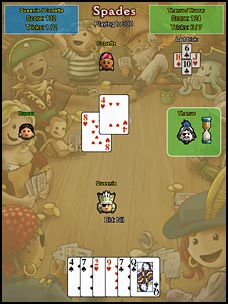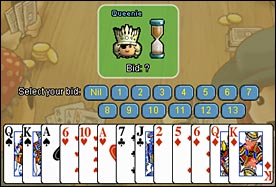Official:Spades
Spades
Contents
The version of Spades that pirates love to play is the four player, fixed partnership game. There are two teams of two, where team members sit opposite each other. Spades is a plain trick game: standard trick play and trump rules apply (spades being the trump suit in this game) and the number of tricks taken is what matters, not what cards were in the tricks taken (as in the game of Hearts). The cards are dealt and played in a clockwise direction.
Ranking of the Cards
A standard pack of 52 cards is used. The cards, in each suit, rank from lowest to highest: 2, 3, 4, 5, 6, 7, 8, 9, 10, J, Q, K, A
Dealing the Cards
The first dealer is chosen at random, and the turn to deal rotates clockwise. The cards are shuffled and then dealt one by one, in clockwise order beginning with the player on dealer's left, until all 52 cards have been dealt and everyone has 13 cards.
Bidding
Each partnership must make a bid, which is the number of tricks they expect to take as a partnership. A trick consists of four cards, each one played by one of the four players. It is important to realize that in Spades both sides' bids stand (it is not like other bidding games in which only the higher bid counts). First, the player to the dealer's left will bid on how many tricks she thinks she can take. Then the dealer's partner will bid on how many tricks he thinks he can take. Next, the second partner of the non-dealer team will make a bid of how many tricks she thinks she can make, keeping in mind what her partner already bid for the team. For example, if the partner to the dealers left bids 3, then if the second partner bids 4 then as a team they must get 7 tricks total, regardless of which of the two players actually takes the tricks. Finally, the dealer will bid on how many tricks he thinks he can take and thus how many tricks the dealer's team expects to take.
Some communication between partners on what they expect to take is allowed. A certain amount of unspecified bantering about "I think" and "maybes" is permitted, but not specific information about cards held. For example you are allowed to say "I know I can take 4 tricks, I might be able to take 6"; you are not allowed to say "I have a couple of high spades and a singleton in clubs".
There are two special cases of bids -- Nil and Blind Nil.
Nil is a declaration that that the player will not win any tricks during the play. Any single player may bid nil. The nil bidder's partner will also bid the number of tricks to be taken by the partnership.
Blind nil may only be bid by a player whose side is losing by at least 100 points. It is a nil bid declared before a player looks at his cards. The bidder may exchange two cards with partner - the bidder passes two cards face down to her partner, who picks them up and gives back two cards face-down in return. Only one partner per team may bid blind nil.
Playing the Hand
The player to dealer's left leads any card except a spade to start the first trick. Each player, clockwise in turn, must follow suit if able; if unable to follow suit, the player may play any card. Players have a limited time to play their card as shown by the hourglass. If they do not play a card by the time the hourglass runs out, then a random legal card will be automatically played for them.
A trick containing a spade is won by the highest spade played; if no spade is played, the highest card of the suit led wins the trick. The winner of each trick will lead the next trick (place the first card). Spades may not be led until either:
- some player has played a spade (on the lead of another suit, of course), or
- the leader has nothing but spades left in hand.
Playing the first spade is known as "breaking" spades.
Scoring
A side that takes at least as many tricks as its bid calls for receives a score equal to 10 times its bid. Additional tricks (overtricks) are worth an extra one point each. For example, if a team bids 7 but wins 8 tricks, then they would receive 7 x 10 = 70 + 1 overtrick point, for a total of 71 points.
Sandbagging rule: A side that (over several deals) accumulates ten or more overtricks has 100 points deducted from its score. Any overtricks beyond ten are carried over to the next cycle of ten overtricks - that is if they reached twenty overtricks they would lose another 100 points and so on. /(Note: it is not necessary to keep track of overtricks separately as the cumulative number of overtricks taken appears as the final digit of the team's score, if positive)./
If a side does not make its bid, they lose 10 points for each trick they bid. For example, if a team bids 7 but wins 5 tricks, then they would lose 7 x 10 = 70 points.
If a bid of nil is successful, the nil bidder's side receives 50 points. This is in addition to the score won (or lost) by the partner of the nil bidder for tricks made. If a bid of nil fails - that is, the bidder takes at least one trick - the bidder's side loses 50 points, but still receives any amount scored for the partner's bid. The usual rule is that when a nil fails, the tricks won by the nil bidder *do not count* towards making the partner's bid.
A bid of blind nil scores twice as much as an ordinary nil - it wins 100 points if successful and loses 100 points if it fails.
Winning the Game
The game ends when either team reaches the winning point total (determined when configuring the game) or either team's score becomes equal to or lower than the negative point total. When the game ends, the team with the higher score wins.


